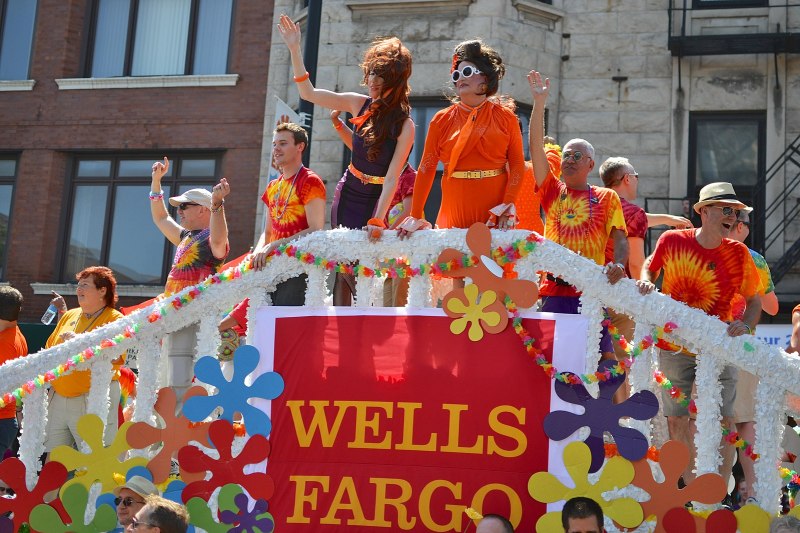When Pride Month 2019 ended, discourse surrounding the often-tumultuous month drew largely to a close. But when companies aren’t pushing rainbows in commercials and cheerily claiming to support the LGBTQ+ community, it is more important than ever to examine those companies’ true ideologies. During Pride Month, it’s trendy and profitable to support Pride, but activities the rest of the year can reveal an ugly truth.
Companies’ logos overlaid with the iconic LGBTQ+ flag, billboards emblazoned with trendy hashtags reading #BETRUE (Nike) and #LiveProud (AT&T), and even Pride-themed mouthwashes have become the norm in recent years, with large companies explicitly supporting the LGBTQ+ community in their advertising campaigns, social media and more.
The veneer is pleasant: It is wonderful to feel supported by these corporations, and by extension, accepted by society at large. But, on a closer glance, a more gray truth comes out of the rainbow pride logos.
Before there was #LiveProud, there was IKEA’s “lifestyle” campaign in 1994, which featured single parents, adopted children and television advertising’s first gay couple. The groundbreaking pair, shown shopping for a dining table, highlighted a part of LGBTQ+ life that did not receive enough recognition: its normality.
“[The advertisement displayed] an aspect of gay life that people never see: our daily lives,” Ellen Carton, head of the New York chapter of the Gay & Lesbian Alliance Against Defamation, once told the L.A. Times. “Instead of showing gays and lesbians marching at gay rights rallies or suffering from AIDS, the IKEA ad humanizes us.”
However, despite running at a late-night time slot, it still received backlash for not being “family friendly.” Ikea recalls having jammed phone lines, protesters and even a bomb threat after the airing. However, the LGBTQ+ community embraced this commercial; While it was a small step compared to today’s brand outreach, it was monumental at the time.
Over 20 years later, much has changed. While people responded to IKEA’s commercial by claiming that upsetting the mainstream would be bad for business, companies today are taking the opposite approach. Now it is common to see companies supporting Pride — and going beyond mere branding, too. Converse, Milk Makeup, Under Armour and American Eagle are among the companies who have created Pride-themed product collections, where 100 percent of the proceeds go to charity. Target, without selling a product collection, donated $100 thousand to the Gay, Lesbian & Straight Education Network (GLSEN) this year.
However, there is an uglier underbelly to the cheery slogans and rainbows emblazoned on advertisements: In a recent report by Popular Information and Progressive Shopper, it was revealed that even the most outspoken Pride-supporting companies have donated roughly $1 million to politicians with anti-LGBTQ+ sentiments since 2017. The top donors were AT&T, UPS and Comcast, all of which have claimed to be supportive of the LGBTQ+ community in social media posts and campaigns.
In response, several Pride parades are banning corporate floats in an attempt to protest the questionably genuine intentions of corporations at parades. In New York, activists launched the Reclaim Pride Coalition.
“This is a clash of values,” coalition founder Bill Dobbs told The New York Times. “Their march stands for corporate pride and the status quo. Ours stands for change.”
In addition, given Pride’s profitability, celebrities’ intentions are called into question. With the release of her camp music video “You Need to Calm Down” last month, Taylor Swift donned a hot pink fur coat and rainbow wig to support the LGBTQ community. Cameos by LGBTQ+ celebrities, such as Hayley Kiyoko, Tan France and even RuPaul himself, were peppered throughout the video.
However, despite the many Pride flags waving in the video, the LGBTQ+ community responded with mixed reactions. The monetized video was released during the height of Pride month.
“She’s telling, not showing,” wrote Caryn Ganz in The New York Times. While her support for gay rights is certainly genuine, and she is now using her immense celebrity to trumpet it, some people are reading her labor here … as having the veneer of something false.”
Perhaps the criticism against Swift’s video is a bit harsh; After all, she has donated $113,000 to a pro-LGBTQ+ organization and has publicly criticized an anti-LGBTQ+ candidate. Yet, in light of the streams of corporations capitalizing off of Pride, the LGBTQ+ community has the right to question her intentions, just like those of many others.
With an increasing presence in the media and advertising campaigns, the true intentions of corporations and celebrities supporting Pride is questionable — after all, the LGBTQ+ community is the fastest growing market, with a current buying power of $1 trillion, according to Forbes.
“There’s no CFO that would justify a little homophobia at the expense of one of the most influential markets,” Jonathan Lovitz, Senior Vice President of the National Gay & Lesbian Chamber of Commerce, told Vice.
Contact Selina Yang at selinay589 ‘at’ gmail.com.
